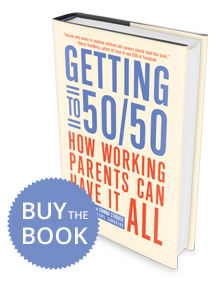FAQ's
1. What is a 50/50 relationship?
50/50 couples believe that both dreams count – that careers are equally important to men and women, and so is having time with your kids. That doesn’t mean 50/50 every day – there may be times when a mom does 80% of the childcare and a dad does 80% of the earning or vice versa, but, over the course of a career, the batons are passed back and forth so that both husband and wife can maintain successful careers and strong bonds with their kids. When they do, our research shows that these couples become happier and enjoy more romance. Based on our survey of 1100 working moms and hundreds of interviews with dual-career men and women, we learned there are many ways to get to 50/50.
2. What problems arise when your relationship isn't 50/50?
A lot of studies on marriage say that when the daily experience of a husband and wife grow too different, the risk of divorce gets higher. That when men don’t see themselves as valuable parents and women don’t see themselves as valuable earners, couples lose the common ground they had when they both had jobs and no kids. Many men who are sole breadwinners told us of the stress they feel. They see peers with working wives who can take risks – like changing jobs – that you can’t take if the whole family depends only on a husband to pay the bills.
3. Will men really go for this?
We talked to a lot of guys who did not start out 50/50 – who expected to live in more traditional marriages. What they told us were things like this: “I have a relationship with my kids my father could not have imagined.” “I know I’ll never be bored” “We have great conversations and our kids have two great role models.” “Having a career was important to her, so it was important to me.” More time with kids, economic flexibility to take risks with their careers, more sex and romance, lower risk of divorce, happier wives, no nagging. When men see how much they win from 50/50, they buy in.
4. What's the best way to talk to your spouse about agreeing upon a 50/50 plan?
It’s easier if you start early in the relationship but we talked to couples who did this many ways. Most important: Make it a friendly conversation. Really think through what you want to say and how you want to say it. Ask lots of questions. Have examples and facts. Research says that the biggest thing that gets in the way of 50/50 is un-discussed assumptions. So discuss them early and often.
5. Won't the kids lose out if both parents are working and trying to do everything else?
Research is clear that dads and moms are equally important to their kids. So when dads work so hard they can’t get home for dinner, that has a cost. On the other hand, there is no respected evidence that maternal employment hurts kids. (Whether moms work or not, the time they spend engaging their kids is not that different – but there’s large variation in the amount of time married men spend with their children).
50/50 parents we studied showed us how having two perspectives makes more time for kids. Dads are very good at questioning traditional “mom” views about what needs to be done. Does that house need to be *that* clean? Do all our meals really have to be home cooked? Moms are good at helping triage on the work front: Do you really need to go to that golf game? Here’s how I made my last business trip 3 days instead of 5 – can you try that? When men and women know that they are equally knowledgeable about how kids and the workplace function, they are more willing to listen to each other and set priorities that are really focused on the kids.
6. Why is 50/50 particularly well suited to today's tough economy?
Dual careers are a financial necessity for most families today. And two career bets are safer than one. In today’s economy, no one can count on a 30 year career. We should all expect that we will want to – or have to – change jobs at some point. When that happens, it’s much easier to make a good choice if there is another person in the family who can pay bills while you are looking.
7. Where are the successful 50/50 couples in the news or pop culture?
The Obamas are a classic example. You have to wonder how much more difficult it would have been for Barack if Michelle had not been a strong breadwinner. It would have been more stressful to raise a family on the savings of a community organizer and public servant – and it's harder to take strategic risks (like running for Senate or President as a relative unknown) if you are the sole provider of income in the family.
8. What's the hardest part of 50/50 for women? And what's hardest for men?
From our interviews, our friends and our own experience, it seems like the hardest thing is for we women to say to ourselves: “My husband’s views about home life are as valid as my own.” And then act that way.
While fewer and fewer men still believe women lack instincts to lead and compete, many women continue to hold onto their own stereotypes about men. Like that men can’t multi-task and have wooden ears when it comes to kids. These beliefs become self-fulfilling.
Research by psychologist Ross Park and others has shown that the biggest predictor of a 50/50 husband is whether his wife believes that men can be equally capable parents – not that “maternal instinct” makes women superior. In these studies, what the wife believed mattered more than what the husband thought on this subject.
For men, a lot of guys worry that other men will think less of them if they do 50/50 – that it is a sissy thing, that you can’t be successful that way. What the evidence shows is that men who do their fair share at home earn as much as guys who don’t.
When men are confident about their masculinity (like an ex- NFL football player we interviewed -- married to a CEO), they’re less likely to think things like “if I’m seen volunteering at my kids school, people will think I don’t have an important job.” We need to help men see the many role models out there – guys who are very successful AND make time for their families.

